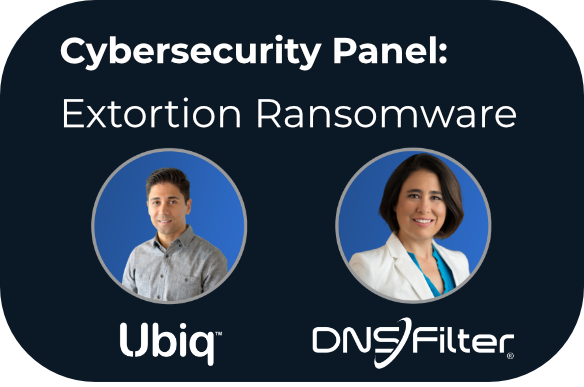
Over the last few months, ransomware has evolved. The threat is no longer just loss of data or paying a hefty ransom—now companies are threatened with what has been coined “double extortion”, the possibility that their confidential or highly sensitive data could be exfiltrated and published online. This means they can find themselves out of compliance with protections like GDPR, putting their customers at risk. And reverting to backups is no longer an easy way to avoid paying the ransom.
In this webinar hosted by DNSFilter and Ubiq, we speak to cybersecurity experts at each company to find out what they think of this trend, what the future holds and some threat mitigation strategies organizations should consider.
The targets aren’t just large companies. Critical infrastructure, such as schools and police departments, giants like Apple, and MSP vendors like Kaseya, have all been targeted. And it’s revealed an unfortunate trend: Ransomware is growing, and double extortion ransomware is the technique of choice.
In this webinar hosted by DNSFilter and Ubiq, we speak to cybersecurity experts at each company to find out what they think of this trend and what the future holds.


Chief Executive Officer
Wias Issa is CEO of Ubiq Security, an API-first encryption platform that is on a mission to simplify and modernize encryption for developers and security teams across the globe. Prior to Ubiq Security, Wias held senior positions at FireEye, Mandiant, and Symantec, where he led security analysis and response teams defending global Fortune 100 companies.
With over 20 years of experience in the cybersecurity industry, Wias has a deep understanding of threat response countermeasures and how the threat landscape has evolved from (mostly) benign attacks) to those that directly impact national security and the safety and well-being of people around the world. Wias is hugely passionate about tipping the balance of power in favor of the good guys and ensuring cybersecurity is top of mind for organizations.
Ubiq is a technology company that has simplified the complex and messy world of encryption through a set of APIs, that are simple enough for any developer to use, yet scalable and extensible enough to encrypt data effortlessly across diverse applications and programming languages, cloud environments, and storage types. By enabling developers to quickly integrate encryption into their applications, Ubiq is empowering innovators around the world to efficiently build more secure products and experiences.

Chief Operating Officer
Jen Ayers is the COO of DNSFilter where her ultimate goal is to change the way the industry thinks about DNS security. Prior to joining DNSFilter, Jen Ayers most recently held the position of Vice President of OverWatch and Security Response at CrowdStrike.
With over a decade of experience in senior roles at leading cybersecurity tech companies such as FireEye and Overwatch, Jen has a deep understanding of the modern threat landscape and how existing tools are evolving to protect organizations. She also held multiple roles for GE as a cyber leader in incident response, computer forensics, and supplier security. Jen has a passion for cybersecurity and looks forward to the day that InfoSec is a priority for every company worldwide.
DNSFilter is a venture-backed startup that provides edge-layer security via DNS for modern companies that are no longer tied to a central office. They protect over 15,000 organizations from ransomware, phishing, botnet, and other cybersecurity threats—all while running on the fastest network within the DNS security industry. DNSFilter identifies threats up to 154 hours faster than competitors, and uniquely categorizes more than 47% of domain-based threats, including zero-day threats.